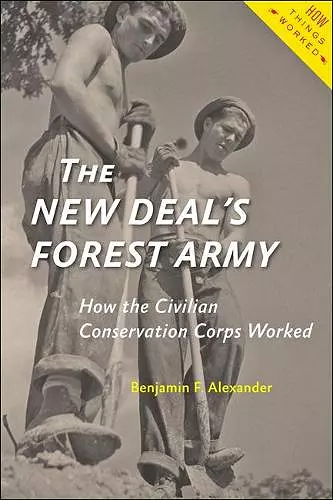The New Deal's Forest Army
How the Civilian Conservation Corps Worked
Format:Paperback
Publisher:Johns Hopkins University Press
Published:16th Feb '18
Currently unavailable, and unfortunately no date known when it will be back
This paperback is available in another edition too:
- Hardback£44.50(9781421424552)

How the Civilian Conservation Corps constructed, rejuvenated, and protected American forests and parks at the height of the Great Depression.
Propelled by the unprecedented poverty of the Great Depression, President Franklin D. Roosevelt established an array of massive public works programs designed to provide direct relief to America’s poor and unemployed. The New Deal’s most tangible legacy may be the Civilian Conservation Corps’s network of parks, national forests, scenic roadways, and picnic shelters that still mark the country’s landscape. CCC enrollees, most of them unmarried young men, lived in camps run by the Army and worked hard for wages (most of which they had to send home to their families) to preserve America’s natural treasures.
In The New Deal’s Forest Army, Benjamin F. Alexander chronicles how the corps came about, the process applicants went through to get in, and what jobs they actually did. He also explains how the camps and the work sites were run, how enrollees spent their leisure time, and how World War II brought the CCC to its end. Connecting the story of the CCC with the Roosevelt administration’s larger initiatives, Alexander describes how FDR’s policies constituted a mixed blessing for African Americans who, even while singled out for harsh treatment, benefited enough from the New Deal to become an increasingly strong part of the electorate behind the Democratic Party.
The CCC was the only large-scale employment program whose existence FDR foreshadowed in speeches during the 1932 campaign—and the dearest to his heart throughout the decade that it lasted. Alexander reveals how the work itself left a lasting imprint on the country’s terrain as the enrollees planted trees, fought forest fires, landscaped public parks, restored historic battlegrounds, and constructed dams and terraces to prevent floods. A uniquely detailed exploration of life in the CCC, The New Deal’s Forest Army compellingly demonstrates how one New Deal program changed America and gave birth to both contemporary forestry and the modern environmental movement.
Alexander's short work is useful in that it offers an introduction to the program overall and insight into its participants' experiences, with a clear narratuve distilled from an impressive array of sources.
—Kim Jarvis, H-Net
Alexander has undertaken an impressive amount of primary research for this project . . . As a result, he has un-earthed some extremely significant, and understudied, information on the Corps. involving the history of several female CCC camps as well as the experiences of African-American, Native-American, and Mexican-American enrollees. Although I, myself, have written a book about the CCC, The New Deal's Forest Army taught me new, interesting, and important facts about the program.
—Neil M. Maher, New Jersey Institute of Technology and Rutgers University, Environmental History
An informative history of America's "tree army" . . . The author's organizational method is outstanding for general readers with little or no knowledge of the CCC as well as appealing to readers who have read extensively about the Roosevelt presidency . . . This volume will be of interest to all readers. The next time you visit a state park with a rustic lodge, take a long look at the bronze plaque noting that it was built by the CCC and be sure to say "Thank you."
—Patricia Ann Owens, South Dakota History
In this concise and deliberate study, Benjamin F. Alexander demonstrates the origin, implementation, and ultimate demise of a program that gained tremendous popularity during the 1930s and ably presents why the CCC remains such a prominent part of New Deal history. Alexander's book is a snapshot of the 1930s with an explicit focus that provides significant depth to the CCC story . . . the book moves at a swift pace and is an eminently readable look at one of the most important periods in American history. Alexander succeeds in explaining how the CCC worked and in doing so provides a book will make a great text for use in the classroom.
—Douglas Sheflin, Colorado State University, Western Historical Quarterly
Benjamin Alexander fills an important gap in the Civilian Conservation Corps (CCC) literature with his detailed description of the program from its inception in the trough of the Great Depression to its demise at the beginning of World War II . . . Alexander weaves statistics and details about events during the program with colorful narratives that make this book an engaging read . . . I believe that anyone interested in the Great Depression era or in relief programs like those in the New Deal will benefit from reading it.
—Erin McGuire, Georgia Institute of Technology, EH.Net
ISBN: 9781421424569
Dimensions: 229mm x 152mm x 12mm
Weight: 272g
192 pages